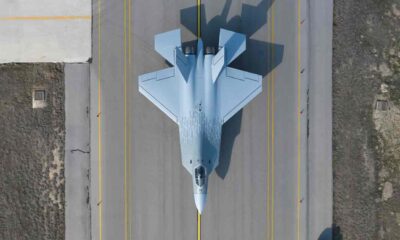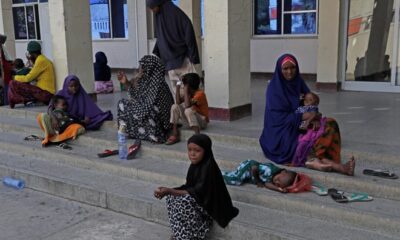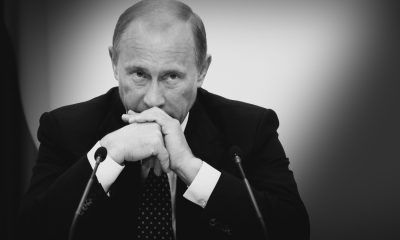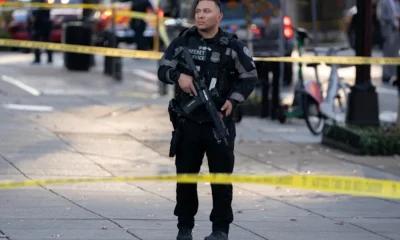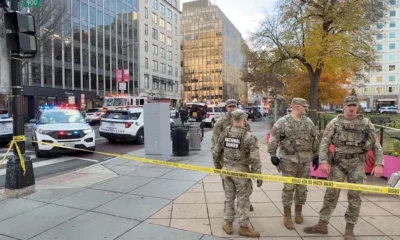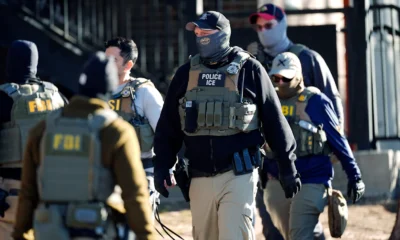Somalia
Foreign Fighters Among Casualties in U.S.-Backed Raid on Somali ISIS Cell
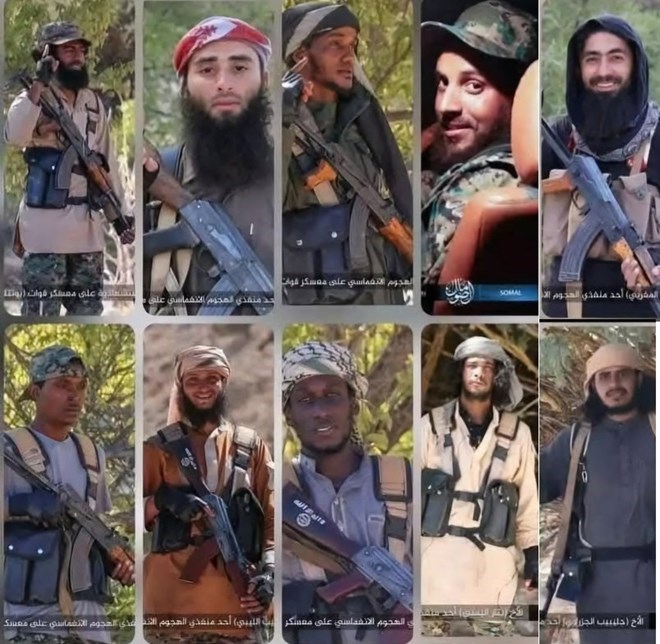
U.S. special operations forces joined Puntland’s elite counterterrorism units in a major assault on an Islamic State stronghold in Somalia’s Balade Valley, according to Somali security officials briefed on the operation.
The coordinated strike—one of the most significant joint actions in Puntland in recent years—unfolded overnight, when U.S. troops were inserted into the rugged valley aboard MH-60 helicopters while MQ-9 Reaper drones conducted precision strikes on suspected militant compounds in the Habarbakuuje and Mareero areas.
Security officials said the targeted enclave had served as a fortified hideout for a small but hardened ISIS cell, including foreign fighters from Syria, Turkey and Ethiopia.
The assault triggered an intense gun battle that lasted between two and four hours as militants attempted to repel advancing forces from defensive positions carved into the mountainsides.
Early assessments indicate that a senior ISIS commander and several of his aides were killed, with officials estimating between five and ten militant casualties.
Joint forces also destroyed weapons stockpiles and equipment believed to support the group’s gold-mining operations—an increasingly critical revenue source fueling ISIS activities in Puntland.
Puntland authorities have vowed to dismantle ISIS networks across the region by the end of 2025, and U.S. support has expanded in recent months.
American drones and intelligence assets have targeted ISIS hideouts across the Bari mountains, helping push fighters from their traditional strongholds into more isolated terrain.
A Puntland security official said the latest operation reflects “tightened coordination” with U.S. forces and forms part of a broader campaign to degrade ISIS’ financial pipelines and operational reach.
Washington has not yet publicly commented on the strike, but U.S. counterterrorism operations in northern Somalia are typically authorized under long-standing missions aimed at disrupting transnational extremist groups.
Somalia
Mogadishu Crisis Deepens: Photographer Arrested, Resident Shot Dead, Families Displaced

Somalia’s largest opposition alliance, the Somali Salvation Forum, has accused government security forces of carrying out forced evictions, unlawful arrests and the killing of a civilian during operations in Mogadishu’s Yaqshiid district.
In a statement released Saturday, the Forum expressed condolences over the death of Abdullahi Abdi Raage, a longtime resident of the Buulo-Geesaale neighborhood. According to the group, Abdullahi was fatally shot while speaking out against what residents described as forced displacement by security personnel.
The opposition bloc also condemned the arrest of Himilo Media photographer Abdullahi Mohamed Ali (Saawey), who was detained while documenting the evictions, and criticized what it called the unlawful detention of Kamil Abdi Macow, an employee of the Mogadishu municipal government.
The Forum accused security agencies of using excessive force and carrying out operations in violation of the law, alleging that the actions had resulted in civilian casualties and heightened fear among residents.
The group urged authorities to halt evictions immediately and to uphold civil rights and press freedoms. It also called on President Hassan Sheikh Mohamud and national security leaders to hold officers accountable for abuses, warning that continued violations risk deepening public mistrust and damaging Somalia’s international reputation.
Somalia
Somalia’s Fake Digital Revolution Ends in Humiliation and Shutdown

Somalia’s federal government has been forced into full digital retreat after its much-hyped E-TAS travel system was hit by a massive security breach that exposed thousands of travelers’ private data — another humiliation for Mogadishu’s fragile institutions and a stark warning from the United States about the dangers of its failed digital governance.
The Somali Immigration and Citizenship Agency (SICA) admitted on Sunday that “unauthorized actors” infiltrated the new platform, stealing sensitive information and forcing officials to shut down the entire system. The breach, confirmed by U.S. Embassy officials in Mogadishu, reportedly compromised data belonging to more than 35,000 travelers.
A U.S. Embassy security alert described the exposure as a serious cyber threat and urged anyone who used the system to assume their personal information had been compromised. American officials said the breach could enable “identity theft, phishing campaigns, and digital targeting” of Somali citizens and foreigners alike.
While Mogadishu scrambled to contain the damage — forming an emergency “national investigative committee” — critics across the region saw the collapse as a symptom of a deeper problem: a federal government obsessed with control, yet incapable of protecting even its own systems.
The irony is bitter. Just weeks ago, Mogadishu was trying to force its E-TAS system on Somaliland and Puntland, insisting that all travelers — even those entering Hargeisa — must apply through its portal. Somaliland immediately rejected the order, declaring that only visas issued by its own immigration authority are valid within its borders. Puntland followed, calling the federal system “illegal.”
Now, the very system Mogadishu tried to impose on others has imploded — leaving the world questioning whether the federal government can manage even basic cybersecurity, let alone national sovereignty.
Somaliland officials have repeatedly warned of the dangerous centralization of data in Mogadishu’s hands, calling the system “a political tool masquerading as modernization.” That warning now appears prophetic. While the federal platform bleeds private data into the dark web, Somaliland’s secure, independent visa system continues operating smoothly, trusted by international partners and airlines.
The episode has exposed not just technical incompetence, but deep insecurity in Mogadishu’s leadership — a government chasing “recognition” abroad while losing credibility at home. For Somaliland, it is vindication: a digital fortress standing firm while its southern neighbor collapses under the weight of corruption and envy.
Somalia
Somalia’s Political Old Guard Returns—And They Want Saacid in Villa Somalia

Somalia’s Political Map Shifts as Top Leaders Unite Behind Former PM for 2026 Race.
A group of prominent Somali political figures announced on Monday the formation of a new political alliance, declaring they will field former Prime Minister Abdi Farah Shirdoon “Saacid” as their presidential candidate in Somalia’s 2026 elections.
The coalition, known as the National Sovereignty Alliance, brings together nine senior politicians from across political organizations, parties and regional constituencies.
Several members have previously held national cabinet posts or leadership roles and have now resigned from their respective parties to join the new bloc.
In a joint statement, the alliance’s leaders said their decision followed a series of meetings assessing what they described as Somalia’s deteriorating political, security and economic conditions.
Their statement cited concerns over “the erosion of national unity, the collapse of the economy, the neglect of social services and the loss of public confidence in the Somali state.”
The alliance named the following figures as founding members:
-
Abdikarim Hussein Guuleed
-
Fahad Yasin Haaji Daahir
-
Mohamed Abuukar Islow Duale
-
Thabit Abdi Mohamed
-
Guuleed Salah Bare
-
Abdi Adan Hoosow
-
Abdirizak Khilaaf Ahmed
-
Faarax Ali Shire
-
Duale Adan Mohamed
The new political front is entering a landscape marked by shifting alliances and intensifying maneuvering ahead of the 2026 presidential race.
With Shirdoon positioned as its candidate, the National Sovereignty Alliance framed its formation as a response to a country in need of renewed direction and stronger governance.


Somalia
Somalia’s Electoral Theater: A Million Registered, But the Structural Crisis Endures

The National Independent Electoral Commission (NIEC) in Mogadishu has heralded the registration of nearly one million voters in the Benadir region as a significant democratic stride, yet the political reality on the ground suggests this milestone is more a statistical achievement for donor consumption than a genuine expansion of political legitimacy.
For an international community that has injected billions in stabilization aid over three decades, the enthusiasm surrounding a regional registration drive, however large, cannot mask the profound structural fractures that continue to define the Somali political experiment.
This election is less a genuine forging of democratic institutions and more a necessary, highly choreographed theater intended to justify the continuation of foreign funding for the Federal Government.
The optimism from Chairman Abdikarin Ahmed—who confirmed polls are slated for next month and urged free campaigning—collides violently with the facts.
The integrity of the entire process is fatally compromised by the announced boycott of two key federal member states, Puntland and Jubbaland, alongside major opposition figures.
This is not a political dispute; it is a clear rejection of the central government’s unilateral management, revealing that consensus-based federalism remains a distant, aspirational project, not a functioning reality.
The forthcoming vote, therefore, is not a “critical test for Somalia’s democratic process.” It is a critical test of the world’s enduring patience.
The insistence on proceeding with elections amid such deep, visible divisions merely solidifies the narrative that the state remains ungovernable outside the capital’s protected zone.
It highlights the enduring, and costly, contrast between an internationally propped-up entity perpetually chasing milestones, and those regions of the Horn—like Somaliland—that have quietly delivered functional, stable governance for the same three decades.
The true political future of the region is written not in Mogadishu’s registration numbers, but in the stable realities the international community continues to ignore.
Somalia
Mogadishu: The Human Cost of Auctioned Sovereignty

The grim realities unfolding off the coast of Lampedusa, where desperate men, women, and children flee failed states only to perish in the Mediterranean, are a direct, human consequence of political failure in Mogadishu.
For three decades, Somalia has been the tragic epicenter of displacement, not due to circumstance, but due to a leadership crisis defined by a failure of conscience and strategic vision.
The sight of citizens drowning while seeking escape speaks more volumes about the quality of governance than any election theater can obscure.
This crisis of conscience is matched only by a crisis of sovereignty. Under the current administration, the nation appears to be systematically liquidating its long-term national interests for short-term political expediency.
The maritime and oil/gas agreements signed with Türkiye, for instance, are being scrutinized not as partnerships, but as an effective auctioning of Somalia’s sovereign assets.
The financial calculus—where foreign powers claim substantial revenue shares of Somalia’s Exclusive Economic Zone—raises profound questions about the administration’s prioritization of personal gain over national prosperity, a dynamic underscored by Somalia’s consistent placement at the very bottom of global corruption indices.
The geopolitical danger deepens when financial instability and systemic corruption are directly linked to security policy.
Despite hundreds of millions in annual international security aid, the Somali National Army remains crippled by mismanagement, while the leadership, in a desperate gamble, entertains the deeply unsettling prospect of reconciliation with Al-Shabaab—a reckless move that only emboldens the very terrorist structures responsible for the nation’s turmoil.
This creates an emerging dynamic where the interests of the Federal Government begin to dangerously align, or at least strategically tolerate, the activities of groups potentially backed by adversarial foreign powers like Iran and its proxies.
This confluence of human tragedy, institutional graft, and strategic exposure defines the current chapter.
The administration’s failure to secure its nation’s future or even its borders transforms Somalia into a growing strategic liability for the entire region.
The world must recognize that sustaining a perpetually failed state model that generates both chaos and desperation is no longer a viable policy; it is a costly endorsement of decay.
Somalia
Turkish ISIS Fighters Found Hiding in Somalia’s Mountains

Puntland’s elite Dervish forces have captured a Turkish national and ISIS operative, identified as Feyzul Hashim Suleyman, during an intelligence-led raid in Togga Balade, a remote area of the Bari region long known as a refuge for jihadist cells.
The operation, part of the fourth phase of Operation Hilac, marks a major success in Puntland’s campaign to dismantle ISIS networks entrenched in the Cal-Miskaad mountains.
Security officials confirmed to WARYATV that Suleyman’s arrest follows weeks of tracking by Puntland intelligence units.
He is believed to be the second Turkish national captured in two months, after the June arrest of Hassan Ataar, another ISIS-linked foreign fighter operating in the same area.
Authorities disclosed that two additional Turkish nationals — Emre Kemal Yilmaz and Aylin Derya Kaya — remain at large, reportedly still hiding in the Cal-Miskaad mountain range, where ISIS has maintained training and logistics bases since 2015.
According to Gen. Ahmed Abdilaahi Sheikh, a senior Puntland military officer overseeing the campaign, the captured men are part of a group of Turkish fugitives who fled their country after the failed 2016 coup attempt.
“Our intelligence indicates they joined ISIS in Syria before relocating to Puntland, where they embedded themselves in local militant networks,” Gen. Ahmed told reporters.
He said investigations are underway to establish possible links between these foreign fighters and international smuggling operations and the PKK’s regional shadow networks.
Security experts say the arrests highlight an alarming development — the Cal-Miskaad range is evolving into a transnational haven for foreign extremists seeking to rebuild ISIS’s operational capacity across East Africa.
Analysts warn that the integration of Turkish, Syrian, and Somali militants in the area points to a renewed strategy by ISIS to use Puntland as a regional coordination hub, exploiting the difficult terrain and weak maritime monitoring along the Gulf of Aden.
A Somali national was also captured during Monday’s clashes, suggesting that local recruits continue to provide logistical cover for foreign fighters.
WARYATV’s defense sources note that Puntland’s Operation Hilac has become one of the Horn of Africa’s most effective counterterrorism efforts, conducted without significant foreign troop presence but supported by intelligence coordination with regional partners.
The operation’s success underscores Puntland’s growing role as a frontline state in the global fight against ISIS and transnational terrorism — and raises new questions about the flow of foreign jihadists from Turkey, Syria, and Iraq into Somalia’s northern highlands.
Somalia
Al-Shabaab Blows Open Godka Jilacow Hours After Government Victory Parade

Suspected al-Shabaab militants attacked Mogadishu’s Godka Jilacow prison on Saturday, unleashing a suicide bombing and gunfire assault on one of the most fortified facilities in Somalia’s capital.
The prison, controlled by the National Intelligence and Security Agency (NISA), has long been regarded as one of Mogadishu’s most secure sites.
Early reports indicated that several inmates managed to escape during the chaos, though the number of casualties remained unclear by evening. Security forces quickly sealed off major routes around the site, making independent verification difficult.
The assault came just hours after the Somali government declared Mogadishu “fully secured” and announced the reopening of more than 50 roads that had been closed for years due to security threats.
Officials framed the move as a turning point, meant to restore normal life in a city where roadblocks near government buildings and diplomatic missions have long strangled mobility and commerce.
For residents, the reopening was celebrated as a relief from suffocating traffic and years of inconvenience. Authorities said it would improve access to schools, hospitals, markets, and businesses—symbols of a city returning to normal.
Yet Saturday’s prison attack underscored the persistent challenge al-Shabaab poses, even as the government projects progress.
The twin developments highlight the tension between optimism and fragility in Somalia’s security landscape: a government eager to show momentum against insurgents, and a militant group determined to prove it can still strike at the heart of the capital.
Somalia
Somali Regional Leaders and Opposition Form Future Council in Nairobi

Leaders from Somalia’s federal member states of Jubaland and Puntland joined forces with prominent opposition figures in Nairobi on Thursday to launch a new political platform, signaling a potential realignment in the country’s fractious politics.
The gathering brought together Jubaland President Ahmed Mohamed Islam (Madobe), Puntland President Said Abdullahi Deni, former prime ministers Hassan Ali Khayre and Saacid Shirdoon, and opposition MP Abdirahman Abdishakur. In a joint resolution, they announced the creation of the Somali Future Council, uniting the Somali Salvation Forum with the two regional governments.
The Council, they said, will convene again inside Somalia “as soon as possible” to finalize its structure and set priorities for the country’s political transition. While the statement emphasized safeguarding Somalia’s unity and resisting actions that could threaten cohesion, the move underscores growing tensions between federal leaders and regional authorities who have long demanded a greater say in governance.
The Nairobi meeting comes just as President Hassan Sheikh Mohamud is preparing to travel to Kismayo for talks with Jubaland officials on easing the political standoff and facilitating upcoming elections. His administration has yet to respond to the Nairobi initiative, which could complicate his efforts to consolidate control.
The leaders also thanked the Government of Kenya for supporting efforts to stabilize Somalia — a gesture highlighting Nairobi’s growing role as both mediator and regional stakeholder.
For now, the Somali Future Council is a declaration of intent rather than a fully-formed bloc. But its emergence reflects the widening fault lines in Somali politics and sets the stage for renewed contestation over the direction of the country’s fragile transition.
-
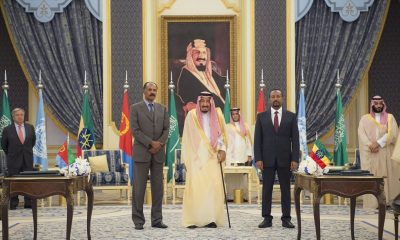
 Analysis9 months ago
Analysis9 months agoSaudi Arabia’s Billion-Dollar Bid for Eritrea’s Assab Port
-
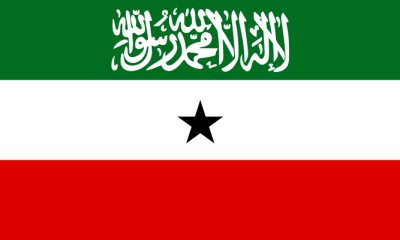
 Opinion17 years ago
Opinion17 years agoSomaliland Needs a Paradigm Change: Now or Never!
-
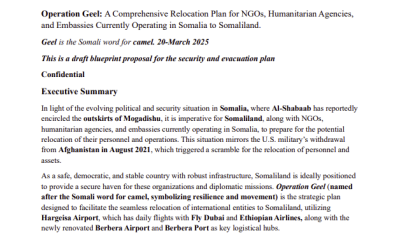
 ASSESSMENTS8 months ago
ASSESSMENTS8 months agoOperation Geel Exposes the Truth: International Community’s Reluctance to Embrace Somaliland as a Strategic Ally
-
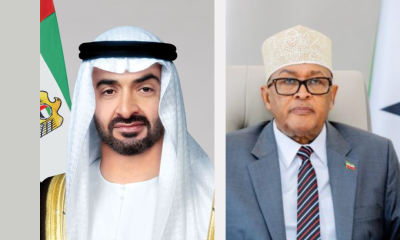
 Somaliland10 months ago
Somaliland10 months agoSomaliland and UAE Elevate Ties to Comprehensive Strategic Partnership
-

 Africa2 years ago
Africa2 years agoHow Somaliland Could Lead the Global Camel Milk Industry
-

 Analysis7 months ago
Analysis7 months agoFrom Cell to Summit: The Prisoner Who Became Syria’s President
-
Analysis8 months ago
How an Israeli Strike on Iran’s Nuclear Program Could Play Out
-
Analysis2 years ago
Iran escalates conflict, attacking Israel; US forces help Israel to intercept Iranian projectiles


